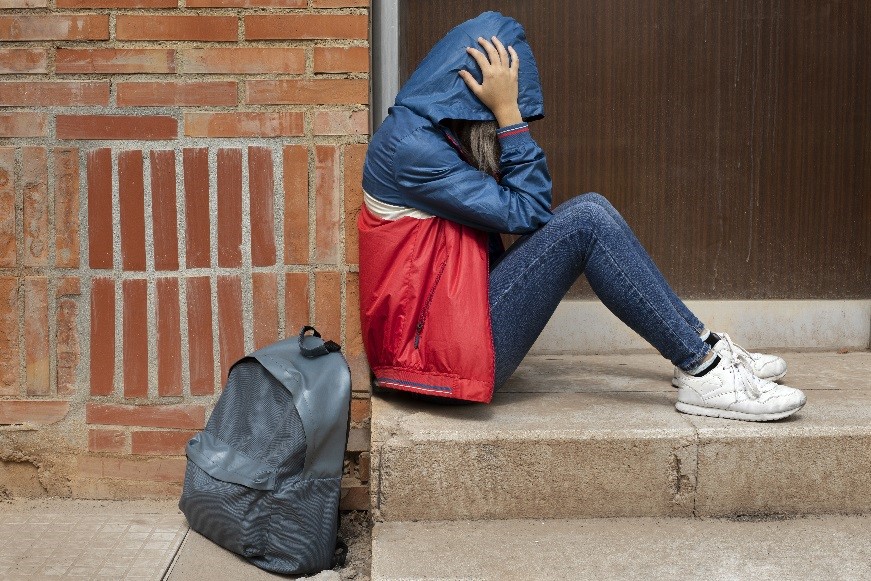SOCIAL ISOLATION IN TEENAGERS

WHAT IS SOCIAL ISOLATION?
Social isolation refers to a behavioral tendency where individuals, isolate themselves from social interactions and activities. This can manifest as avoiding friends, skipping social events, or spending excessive time alone.
WHAT CAUSES SOCIAL ISOLATION IN TEENAGERS?
Social isolation in teenagers can stem from various interrelated factors:
- Adolescence is a critical period for exploring identity. Teens who struggle to fit in or feel alienated from their peer groups may withdraw as they seek to understand themselves without the pressures of social interaction.
- While social media can facilitate connection, it often leads to comparison and toxicity (e.g: body shaming). Teens may feel more comfortable interacting online, leading to less real-life engagement and increased isolation.
- Teens who suffer childhood trauma or have ongoing constant criticism at home develop low self-esteem and often shame, resulting in isolation. Feelings of inadequacy in school can further exacerbate withdrawal as they avoid situations where they might feel judged.
HIGHER RISK OF SOCIAL ISOLATION IN TEENAGERS:
Adolescence is an uncertain period of life. One has to deal with the new norms about oneself and the world. Thus, teens are at a higher risk of developing social anxiety & depression.
While some degree of solitude can be normal during adolescence, prolonged withdrawal from social life can lead to negative consequences, such as increased feelings of loneliness, impaired social skills, and academic struggles. It often indicates underlying emotional distress and can impact a teenager's overall well-being. Addressing social isolation involves fostering open communication, providing support, and encouraging engagement in social activities to help in letting go and becoming self-aware.
EFFECTS OF SOCIAL ISOLATION ON MENTAL HEALTH:
Social withdrawal in teenagers can have significant and lasting consequences that affect various aspects of their lives:
1. Emotional Distress:
Prolonged withdrawal from socializing often leads to increased feelings of loneliness, FOMO, anxiety, and panic. The lack of social interaction can intensify these emotions, creating a vicious cycle where the teen feels trapped in isolation. In 2021, 519 studies were analyzed to see the effects of social isolation on children's and teenagers' development. The review shows a strong association between social isolation and anxiety and depression in children and adolescents, putting them at a risk of self-harm. It also reveals that social isolation triggers a surge in cortisol levels, leading to heightened stress and disruption in cognitive development.
2. Impaired Social Skills:
Adolescence is a critical time for developing social skills. Withdrawal can hinder the acquisition of essential interpersonal abilities, making it challenging for teens to engage in relationships later in life. They may struggle with communication, conflict resolution, and empathy, which are vital for healthy relationships. This disruption often gives rise to negative social traits like pleasing people and bullying.
3. Academic Decline:
: Isolated teens may experience decreased academic performance due to disengagement from school activities and social learning opportunities. It can lead to lower motivation and participation, ultimately affecting their grades and educational outcomes.
HOW TO HELP A TEENAGER WHO IS ISOLATING?
Dealing with social isolation in teenagers requires a supportive and proactive approach:
● Open Communication:
Encourage honest conversations about feelings and experiences. Create a safe space for the teen to express their emotions without judgment. Help them re-enter social situations slowly. Start with low-pressure activities, such as small gatherings with close friends, to build confidence. Demonstrate positive social interactions and coping strategies. Share your own experiences to normalize feelings of anxiety and promote resilience.
● Encourage Activities:
Suggest participation in clubs, sports, or hobbies that align with their interests. Structured activities provide natural opportunities for social interaction and mindfulness. Understand that overcoming isolation takes time. Offer consistent support and encouragement as they gradually rebuild connections.
● Professional Support:
If withdrawal is severe or persistent, consider seeking help from a trained mental health professional. Behavioral therapy can address underlying mental health issues and help in building emotional intelligence.
A WORD FROM MENTAL NURTURING:
Adolescence is marked by a heightened sensitivity to social cues, peer pressure and an increased desire for interaction. Adults who experienced significant withdrawal during their teenage years may continue to struggle with relationships and emotional regulation.
Social isolation in teenagers can lead to significant challenges in emotional and psychological development. While some solitude is natural, persistent withdrawal may signal deeper problems. Socially isolated teens may face challenges in navigating adult responsibilities, such as job interviews and workplace dynamics. The lack of social experience can hinder their ability to form professional networks and maintain stable relationships.
Addressing this behavior early through open communication, supportive relationships, and professional help is vital. Creating an understanding environment encourages teens to learn how to deal with depression and everyday anxieties in life. By fostering resilience and social engagement, we can help teenagers navigate their formative years and build a foundation for healthier relationships in adulthood.
RESOURCES:
1. Taylor, H.O., Cudjoe, T.K., Bu, F. et al. The state of loneliness and social isolation research: current knowledge and future directions. BMC Public Health 23, 1049 (2023).
https://doi.org/10.1186/s12889-023-15967-3
2. Primack BA, Shensa A, Sidani JE, Whaite EO, Lin LY, Rosen D, Colditz JB, Radovic A, Miller E. Social Media Use and Perceived Social Isolation Among Young Adults in the U.S. Am J Prev Med. 2017 Jul;53(1):1-8. doi: 10.1016/j.amepre.2017.01.010. Epub 2017 Mar 6. PMID: 28279545; PMCID: PMC5722463.
3. Orben A, Tomova L, Blakemore SJ. The effects of social deprivation on adolescent development and mental health. Lancet Child Adolesc Health. 2020 Aug;4(8):634-640. doi: 10.1016/S2352-4642(20)30186-3. Epub 2020 Jun 12. PMID: 32540024; PMCID: PMC7292584.

Written By:
Rumsha Abdul Aziz, MS Psychology
On Octuber 11, 2024

